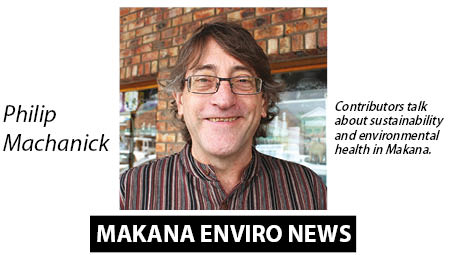Compiled by Philip Machanick
ME News Turns 300
This is the 300th Makana Enviro-News column. On Tuesday 25 October 2005 the first column appeared and the column has continued through a succession of editors:
Nontyatyambo Petros, Jonathan Ancer, Steven Lang and Sue Maclennan. While we now only publish once a month instead of every second week, the column remains a project for those interested in learning about and spreading the message of environmental sustainability, an increasingly urgent concern as the human footprint on our planet threatens our very basis for existence.
With this column’s legacy in mind, I turn this time to the dilemma of how to foster a sustainability mindset.
Think Sustainable
If you have ever been part of a big organisation, this sort of debate may be familiar.
You argue for policies like rainwater harvesting, eliminating single-use plastics and energy efficiency. Because large faceless bureaucracies do not heed moral argument, you develop an economic case.
You demonstrate that a certain light burning 10 hours per day would save the cost of replacing it by an LED unit with three months’ reduced electricity costs. The management layer nods sagely and says, “Interesting. We will consider replacing it when it burns out.”
You argue long and hard for the merits of rainwater harvesting. You work out that for less than 1% of the cost of each new building, you can save enough rainwater to take your organisation through a major drought. Your plans are shoved into the same dusty corner as every other such proposal. Then there is a major water crisis. Faced with the possibility of the organisation failing, millions of rand are found for short-term quick fixes that have no use once the crisis has passed. You try to point out that the same money, spent on rainwater harvesting, could have averted the crisis and only manage to provoke anger.
A discussion brews on managing garden waste in a way that not only reduces the cost of handling garbage but also saves on buying in compost. Your views are dismissed as pie in the sky and insulting to those in charge who are managing on a tight budget.
What is the common thread here?
It is short-term thinking: a cost that saves costs later is dismissed as unaffordable. Part of the reason for this sort of thinking is the way large organisations partition running and capital costs. A capital budget is seen as a competition for short-term resources; running costs are an on-going expense. Once you have established the parameters for running costs, you can keep arguing for the same amount each year. If you argue for a larger slice of the capital pie to reduce running costs, you break the partition. You also (in the spirit of organisational empire building) become less important if your running costs are reduced.
So what is the solution?
There are two strategies that work: leadership from the top and grass-roots pressure.
Leadership from the top can only occur if leaders are for sustainability; grass-roots pressure can force change even without that.
What makes this so hard?
I am increasingly convinced that it is a personality difference. It is simply not in some people’s makeup to think sustainable.
I have been through carefully reasoned arguments with people who have a strong quantitative background who, after all argument is exhausted and the case clearly made, still react the same way. Their eyes glaze over and they look for another “Yes, but …” rebuttal.
For others, it is obvious that sustainability is the way to go.
If this is the case, what is to be done? The best answer, as with any intractable interpersonal difference, is not to waste your energy on people who refuse to get it. The overwhelming majority of the population are not deeply ideologically opposed to sustainability – though many may require positive pressure to change, or economic incentives to change their behaviour. Consider for example how much better Europe does than the US in this respect, and Europe is not populated by a different species of humanity.
Grass-roots activity, in a setting where leadership happens to be concentrated in the hands of those with an anti-sustainability mindset, can and must force change. The future of our species’ habitat depends on it.



